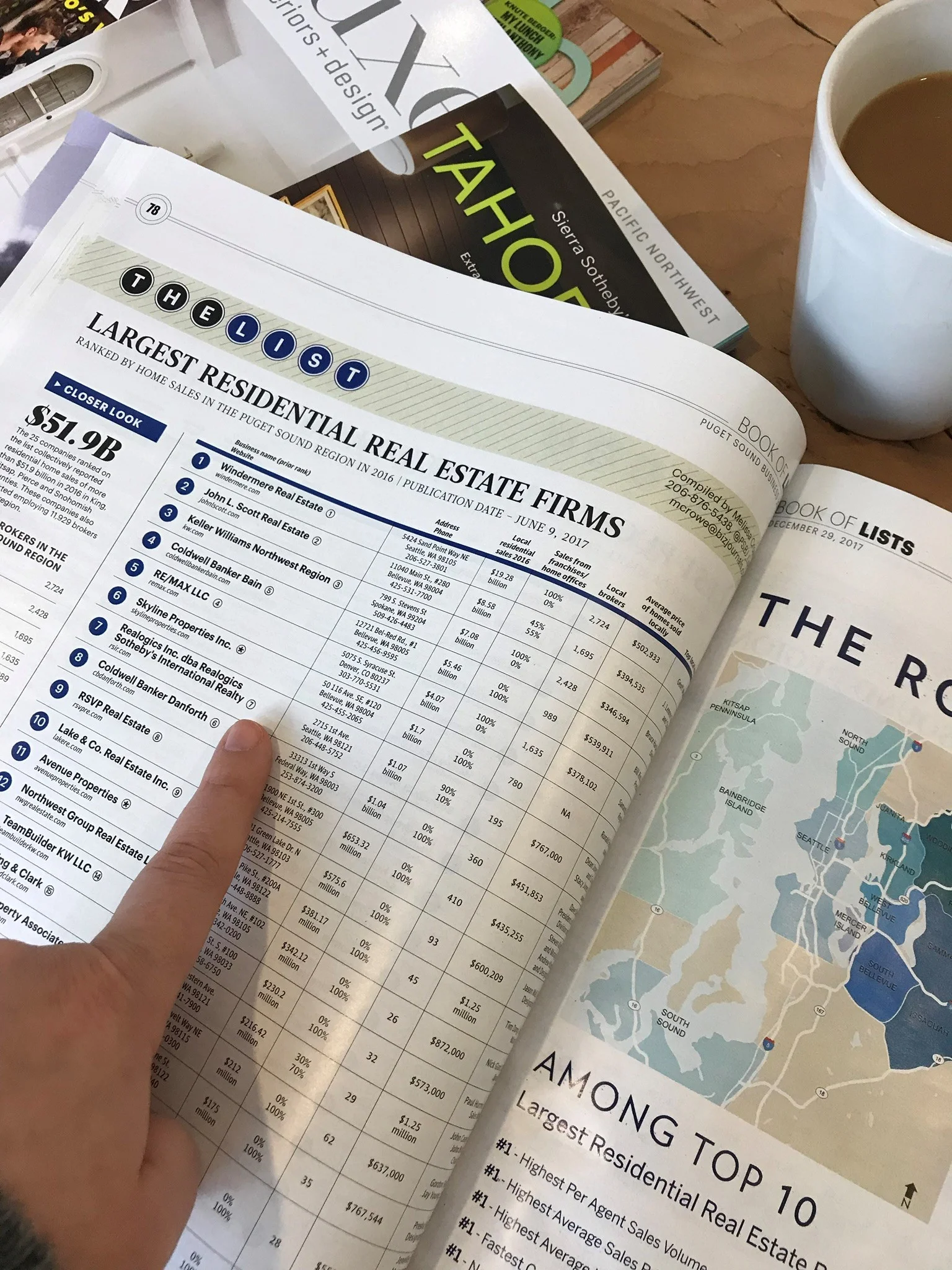As home prices in the greater Seattle region continue to increase and the city has maintained its lead on the S&P CoreLogic Case-Shiller Home Price Index for eighteen consecutive months, a question has come to the minds of many would-be sellers: “do I really need an agent to sell my home in this red hot market?” In a conversation with King 5 News back in April, RSIR broker Austin Schneider tackled the question, as the news outlet weighed the pros and cons of “For Sale by Owner” (FSBO) and low commission companies such as Savvy Lane. We sat down with 6 Realogics Sotheby’s International Realty (RSIR) brokers for their take.
“Because the Seattle market is so hot, the perception for some is that it’s easy to sell a home. In some respects, this may be true. A seller could likely put a sign in the yard themselves and get someone to buy the home quickly because right now, demand outpaces supply,” says RSIR broker Phil Greely. But, he adds, it isn’t about just getting one offer on the table. “An experienced agent can position a home and execute a marketing strategy to get multiple offers. We want 3 offers instead of 1. 15 offers instead of 3. With correct pricing, innovative marketing, and a dedicated focus, agents can bring more buyers and money to the seller than if the seller tried to do it all themselves.”
To be sure, Upnest data reveals that sellers can see a net profit increase of between 10 to 30 percent more when the enlist the help of an agent, a figure that far outweighs the ‘savings’ of cutting a 1.5- to 3-percent commission on sales price.
RSIR broker Jay Kipp says it takes a unique and refined skillset to perfectly price and present a property for the market, not to mention managing it once it goes active. “Our market moves quickly, so this can be an enormous endeavor for even the most skilled professionals.” Given the time involved in navigating the process, Kipp is surprised “when sellers of luxury real estate–such as Directors, VPs or C-Level executives whose time is incredibly valuable–lose sight of the fact that contract negotiations can take an immense amount of time and be in increments of hundreds of thousands of dollars, which dwarfs any savings on earned commission.”
It is certainly true that an agent brings innumerable skills to the table when selling a home, one of which is an ability to drive a buyer from being interested to having their heart set on it. Eddie Chang touched on this ability in a recent piece he wrote on The Art of Storytelling and Why Listing Brokers Matter. Chang talks about the way that emotions are outweighing logic as home prices continue to rise in our region.
According to Chang, when comes to marketing a home, it all comes down to the story. “It is not about how many bedrooms, how many square feet, or even how big and nice the kitchen is,” he writes. “A great broker will tell the story through the presentation of what it feels like, to come home from work, walk through the door, take off your coat, and unwind after a day in the office. A great broker will paint a beautiful picture and get buyers emotionally involved. A great broker will help buyers look forward to what every room brings, and the possibilities of a life in the home.”
The typical seller is not an expert in market trends, pricing, or telling the story of a home, which can hurt their outcome and make the entire process more difficult, and these pressures are often felt well before they move into one of the toughest aspects of selling a home: negotiation. Many of the agents we interviewed discussed the perception of those that choose to do it on their own. As Upnest reports, “agents often see FSBO sellers as easy targets to negotiate against because they [as the professional real estate agent immersed in the business] have the upper hand.” And this advantage, also gives them the capacity to pick apart the home or it’s price because they have the expertise and authority to do so.
“Sellers who ‘go it alone’ are actually my favorite kind of seller,” notes Eleanor Heyrich, broker with RSIR, “because all the advantages that sellers typically enjoy in a hot seller’s market like the one we currently have in Seattle disappear and the leverage ends up on the buyer’s side.”
Heyrich, who primarily works within a ten-mile radius in Seattle, says it’s hard to beat the expertise of an agent that truly knows the ins and outs of a neighborhood and its market. Earlier this year, Inman News talked about the function of the hyper-local agent as they outlined a “farm-to-table” concept in the real estate industry. The notion rejects the idea that a home sale can be brought down to just algorithms and data, instead weighing the cost-benefit analysis of working with a human who will advocate for you and who is a local expert serving a particular region. This means the agent has a strong network, they’ll know the names of officials in county and town offices, understand what’s happening with zoning and development, articulate the impact of travel times and a neighborhood’s personality, and more.
The benefit of this type of connected agent shines through in a recent testimonial that RSIR broker Bob Wold shared, as his client said: “I was seriously thinking about selling by owner, but I am glad I chose Bob to be our listing agent. He was on top of it from the very beginning! After going through our home for the first time, he gave a punch list of items he wanted us to work on before placing our home on the market. He had contacts to help with repairs, landscaping, cleaning, and handyman work. He knew the market and what our home should sell for. If I would have done it myself, I would have asked for too little. I could not be happier with my experience!”
Wold says that even if a seller doesn’t elect to try FSBO and instead chooses a “full-service” company that only takes a 1% commission, it’s important for the seller to comprehend exactly what their version of “full-service” means. “Is the broker that is negotiating on the seller’s behalf the one who actually prepared the CMA? Have they even seen the home that’s listed? Is there a marketing plan in place? Will there be broker or public open houses? Have they advised the seller on things such as offer review dates, PSA, home inspections, etc.? Will the listing broker act as the sole point of contact with other brokers or is the seller expected to field calls?” At the end of the day, he says it really isn’t the level of service that makes a difference, “it’s the broker’s judgment and experience.”
Statistically speaking, selling on one’s own can make for a tough go of it, as the 2017 Zillow Group Consumer Housing Trends Report reveals that of those that go FSBO, only 11 percent actually manage to sell without professional representation. And when polled regarding the value of an agent, the report lists advice about repairs and updates, and determining the correct pricing as the two most important factors highlighted by sellers.
When it comes down to it, a home might indeed “sell itself” in Seattle right now, but those that are selling have to consider the education, advisement and expertise a professional real estate broker brings to the table, whether they feel comfortable handling issues that may arise in negotiations and the transaction process, how much time they have to invest in marketing and selling a property, and the way they’ll handle pricing a home. Because ultimately, as a trusted professional, a seller’s agent is there to act as a strong advocate and ensure a seller receives the type of return on investment they deserve.
As Schneider says, “an agent will give their unbiased opinion based on the market. They will help prepare your home for sale, market it on a global platform, and handle negotiation and sales. Full-time brokers are full-time brokers for a reason. They devote their time in optimizing the home in the best interest of their clients, which translates to getting the most money for them.”
After all, do you really want to undertake all of the responsibility that comes along with the sale of your home while running the risk that you could have ultimately made more money when paying a broker’s commission and allowing them to do the heavy lifting for you?
Source: RSIR




































